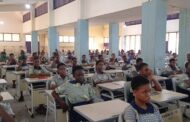The Dormaa Central Municipal Director of Education, Rev. Father Kingsley Dwamena Asante, has observed that numerous factors contribute to teachers’ reluctance to serve in rural communities, adversely affecting the teacher-to-student ratio in these areas within the Dormaa Central Municipality.
During an appearance on GIFTs FM’s morning show, the Education Director highlighted that accommodation is a significant issue, compelling teachers to commute daily from Dormaa Ahenkro to nearby communities.
Additional concerns include exorbitant rent charges, as the community perceives teachers as affluent, prompting appeals to local chiefs and landlords to lower these costs adding that challenges with electricity and network connectivity were mentioned, given that many teachers rely on the Internet for lesson planning and teaching resources hence lack of network diminishes the appeal of accepting rural postings.
He underscored that both past and present governments have pledged special allowances for teachers who choose to work in rural areas, urging that these promises be fulfilled to incentivize teachers to enhance education in these locales.
Exposing the infrastructural challenges confronting the Dormaa Central education directorate, Rev. Fr. Kingsley Dwamena Asante observed that some kindergarten pupils are compelled to study beneath trees due to the absence of classrooms in certain communities, forcing them to abandon school when it rains.
He remarked that primary schools face similar difficulties, therefore, he is appealing to the Municipal Chief Executive, Member of Parliament, and other stakeholders to assist in providing the necessary infrastructure to suitably accommodate the learners.
He expressed gratitude to the previous government for their support, yet underscored that their assistance was insufficient, hence the need for further contributions to elevate educational standards within the Municipality.
In light of the infrastructure deficit, the education director revealed a shortage of furniture, indicating that approximately 4,800 dual desks are required to resolve the furniture crisis.
He stated that the current situation forces three or four students to share a single chair, with others standing or crouching during lessons.
He mentioned that while the Member of Parliament, the Assembly, and other stakeholders have provided some support to the directorate in the form of furniture, their contributions have proven insufficient. Consequently, there is a need for over 4,000 dual desks to fully address the furniture challenges and improve the learning environment.
Source:Mybrytfmonline.com


















































